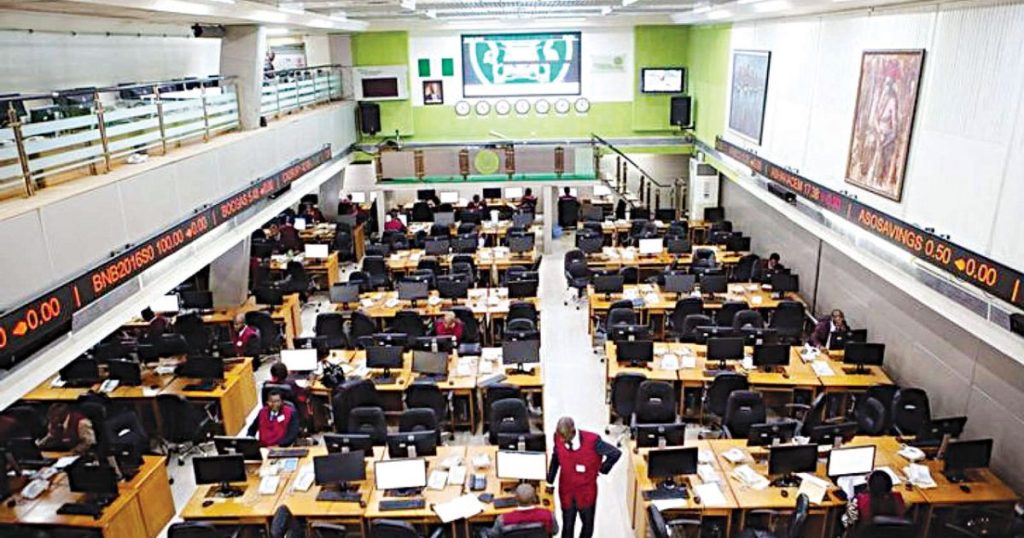The Nigerian stock market demonstrated resilience during a shortened trading week marked by public holidays for Eid-el-Kabir and Democracy Day. Despite only three trading days, the market closed on a positive note, with the All-Share Index appreciating by 0.71 percent to reach 115,429.54 points. This upward movement translated to a N513 billion increase in market capitalization, which closed at an impressive N72.788 trillion. While trading volume decreased compared to the previous week, with 2.057 billion shares traded worth N51.015 billion, the overall positive sentiment indicated a robust underlying market strength. The financial services sector dominated trading activity, accounting for over half of the total turnover volume and value. This highlights the continued investor confidence in this sector, which serves as a key driver of market performance.
The market’s positive trajectory was fueled by strong performances in several key areas. Blue-chip stocks continued their upward momentum, attracting significant investor interest. The financial services sector, with major players like Access Holdings Plc and Zenith Bank Plc, experienced substantial trading activity. This renewed investor confidence in the financial sector contributes significantly to the overall market buoyancy. In addition, companies like Tantalizer Plc saw significant trading volume, further showcasing the breadth of market participation. While the overall market direction was positive, sectoral performance was mixed. While many indices closed higher, some, including Insurance, Oil & Gas, and Commodity Indices, experienced declines. This variation suggests that investor sentiment is discerning, with specific sectors facing unique pressures and opportunities.
A deeper look into the trading activity reveals the dynamics within the market. The financial services industry led the charge with a turnover of 1.060 billion shares worth N26.371 billion. This was followed by the services and consumer goods industries, indicating a broad-based participation across various sectors. The dominance of the financial services sector, however, underscores its crucial role in driving overall market performance. The top traded stocks, Access Holdings Plc, Zenith Bank Plc, and Tantalizer Plc, further emphasize this trend. Their combined trading volume accounted for a significant portion of the total market activity.
Beyond the equity market, activity in the Exchange Traded Products (ETPs) segment witnessed a slight decrease in trading volume compared to the previous week. However, the overall value traded remained relatively stable. This suggests a potential shift in investor preferences within the ETP space, possibly influenced by market conditions or specific product offerings. The relatively modest activity in the ETP market suggests that it remains a niche segment within the broader Nigerian stock market.
The market sentiment, often measured by market breadth, remained positive. More equities recorded price appreciation than depreciation, with 55 gainers compared to 39 losers. This indicates a bullish outlook among investors, suggesting an expectation of continued market growth. The larger number of gainers compared to losers provides further evidence of the strong underlying positive sentiment driving the market. Alongside this, a considerable number of equities remained unchanged, indicating a degree of stability within certain segments of the market.
Several corporate actions also influenced market dynamics during the week. Notably, the suspension of trading in Notore Chemical Industries Plc shares due to its impending delisting represented a significant development. This action protects investors from potential risks associated with trading in a soon-to-be-delisted security. Furthermore, dividend declarations by several companies, including Industrial & Medical Gases Nigeria Plc, Japaul Gold and Ventures Plc, and Dangote Cement Plc, likely contributed to investor interest in these stocks. Dividend announcements often boost investor confidence and can lead to increased trading activity. These corporate actions play a crucial role in shaping investor behavior and influencing market movements. They provide valuable insights into company performance and future prospects, affecting trading decisions and overall market sentiment.
Despite the positive close for the shortened trading week, the subsequent resumption of full trading revealed a contrasting trend. The Nigerian Stock Exchange experienced a market value loss of N378 billion as trading resumed after the holiday break. This significant decline highlights the inherent volatility of the market and underscores the influence of external factors, including global economic conditions and domestic political developments. While short-term market fluctuations are common, this sharp downturn emphasizes the need for investors to remain vigilant and adapt their strategies to changing market conditions. The long-term prospects of the Nigerian stock market, however, are likely to depend on a combination of factors, including macroeconomic stability, policy reforms, and continued growth in key sectors.














